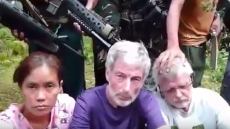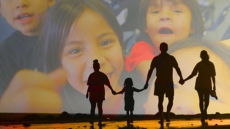FORT MCMURRAY, Alta. — A thick cloud of acrid smoke hung over Fort McMurray on Wednesday morning as tens of thousands of people who have fled the wildfire that has ravaged parts of their city wondered about family, friends and their homes.
"It is what it is and we will wait to see what happens," Dawn Pike-Cumby said at a roadside turnoff as she fed her children slices of melon.
"You hope for the best but you can't do much. If it is gone it is gone."
A seemingly endless line of cars and trucks headed south toward Edmonton overnight and into the early morning hours seeking refuge from the flames.
Others drove north of Fort McMurray where oilsands companies opened their work camps to shelter evacuees.
Kyla Penner seemed calm but was still processing the hectic hours in which she had to call parents to pick up their children from the home daycare she operates in the city.
As the fire and smoke closed in she quickly packed some clothes and food, wondering where to go with her family.
First she drove north and then turned south, thinking about her mother-in-law who was in another neighbourhood and had to be saved by a helicopter.
"My family for the most part is good," she said smiling while holding her son in her arms.
"There is no word about our home. It won't be a shock if it is not there."
April Bolger said she spent more than an hour frantically calling 911 from her home to seek help for Lilly, her 20-month-old daughter, who suffers a heart condition.
Bolger said the dispatcher told her she would better off driving out of the city herself.
"I couldn't even take her outside without her losing her breath," she said while waiting for a break in the traffic.
"I had to put a drenched towel over her face to bring her to my vehicle."
Bolger was heading to Edmonton, hoping to get Lilly into the Stollery Children's hospital.
Gerry Murphy said the traffic was so clogged as people fled that it took him more than two hours just to drive out of his neighbourhood.
His wife Golda said the evacuation order came as they were planning to celebrate their grand-daughter's 16th birthday.
"It wasn't looking good when we drove out of the driveway," he said. "It is devastating, just totally devastating."
Shawn Brett was sitting at home when some friends phoned, warning him to get out of the city quickly.
Brett said when he opened his front door he could see smoke and flames as police urged people in his neighbourhood to evacuate.
Jumping on his Harley Davidson, Brett said he had no time to grab belongings and was almost too late.
"I literally drove out of the flames. I had ashes hitting me in the face," he said.
"Everything was jammed. You had people all over the place. The gas station was on fire. It was the biggest chaos I have ever seen."
The havoc wrought by the wildfires didn't stop people from thinking about how others were being affected by the calamity.
As she watched the smoke billowing over the city Pike-Cumby quietly sobbed as she paid homage to the first responders who were trying to keep people safe.
"The RCMP, the firefighters - from the bottom of our hearts, thank-you," she said. "Without your calm presence we wouldn't be here today."
HUMANS CAUSE MAJORITY OF WILDFIRES IN CANADA: SCIENTIST
A forest fire researcher says weather conditions have helped intensify the wildfire that has ripped through parts of Fort McMurray in Alberta, but he believes the cause was likely human.
Mike Flanagan, a professor of wildland fires at the University of Alberta, says the warm, dry winter has led to an abundance of dead, dry leaves and wood across the province that is ready to light up.
He says the lack of rain, low humidity and lack of green vegetation combined with windy conditions led to the incredibly intense fire in the northern Alberta city.
Although officials haven't discovered the cause of the fire, Flanagan believes it was likely human because of its proximity to the city and because the other major ignition factor, lightning, hasn't been prevalent in the area so far this season.
Tim Lynham, a forest fire researcher with Natural Resources Canada, says wildfires have significantly increased over the past 40 years due to rising temperatures.
Lynham says humans are the cause of the majority of forest fires in Canada.
WILDFIRE FORCES SHELL CANADA TO SHUT DOWN OILSANDS MINING PROJECT
FORT MCKAY, Alta. — Shell Canada has closed its oilsands mining operations 70 kilometres north of Fort McMurray because of the wildfire raging through the northern Alberta city.
The company says it shut down production at its Albian Sands project in Fort McKay to get employees and their families out of the region.
Spokesman Cameron Yost says it also wants to free up space at its 2,000-person work camp for some of the 80,000 people ordered evacuated from the city.
Shell is using its landing strip to fly employees and their families to Calgary or Edmonton and has provided two teams of firefighters to combat the blaze.
Shell's two mines at the Albian Sands site have capacity to produce 255,000 barrels of oil per day.
Suncor Energy says it has reduced production and staffing levels at its main oilsands mine just north of Fort McMurray, but the facility is not in immediate danger from the fire.
Most but not all incoming flights to the Fort McMurray International Airport, located southeast of the city centre, were shown as cancelled on its website on Wednesday morning.
Almost all the departing flights were scheduled to leave on time.
RAGING WILDFIRE IN ALBERTA COMES FIVE YEARS AFTER SLAVE LAKE BLAZE
The wildfire that is devastating large swaths of the northern Alberta city of Fort McMurray comes just five years after another blaze destroyed 400 buildings and left 2,000 people homeless in Slave Lake, Alta.
The Slave Lake fire started May 15, 2011, forcing 7,000 people out of the community after flames whipped by 100-kilometre-an-hour winds laid waste to hundreds of homes and businesses.
Some estimates pegged the damage at up to $1 billion, which insurance adjusters estimated at the time made it the second-costliest disaster next to the Quebec-Ontario ice storm of 1998.
The Slave Lake fire was driven by five consecutive days of winds averaging between 50 and 60 kilometres an hour — an event that had been unprecedented in 35 years of weather records in the area.
No one was hurt, but a fire-fighting helicopter pilot died after crashing on Lesser Slave Lake. About 1,400 firefighters along with 170 helicopters and tankers were deployed to Slave Lake, which is about 430 kilometres away from Fort McMurray and 250 kilometres northwest of Edmonton.
It was later determined that the an arsonist recklessly or deliberately ignited the forest fire that reduced a third of Slave Lake to rubble.
Images of entire neighbourhoods razed to ash and homes reduced to charred cement foundations, were beamed around the world. Soon after, Prince William and his wife Kate made an impromptu visit during their cross-Canada tour to show support.
A subsequent report into the disaster found Alberta's forest fire danger had grown to the point where it was beginning to outstrip the province's ability to respond. It said the wind-whipped fires moved faster than officials were able to communicate with each other or the people of Slave Lake. As a result, residents weren't told about how quickly the danger to themselves and their community was escalating.
The report also pointed to communication troubles between the provincial government and other organizations, finding overloaded radio systems, power outages and loss of cellphone coverage made things worse.
Some residents complained that they weren't given enough warning and were forced to turn back into the inferno when they tried to leave town because they found that roads had been closed.
The province delivered almost $300 million in aid, including millions for modular homes for residents who lost everything.










